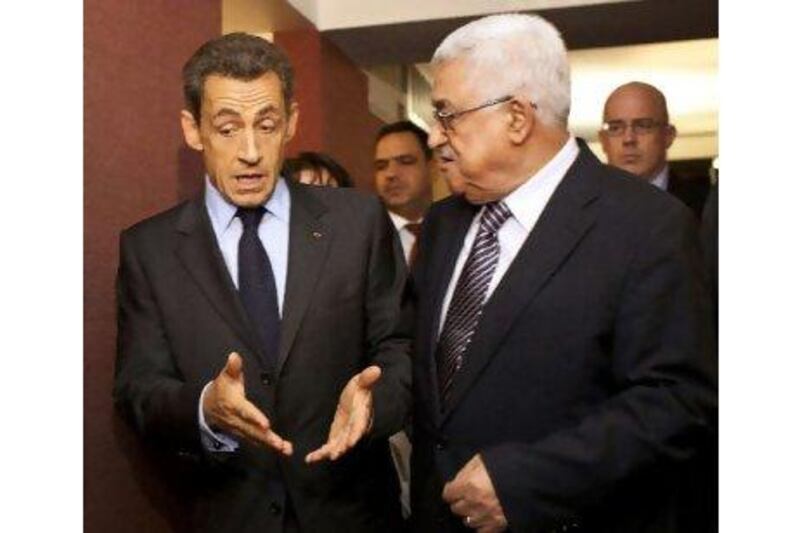AMSTERDAM // The Palestinian bid for statehood at the United Nations is turning into an unwelcome distraction for a Europe that is elsewhere engaged. The continent's leaders, whether at the EU in Brussels or in other European capitals, give the impression that if they have to take time off from managing the financial crisis, they would rather spend it on dealing with the popular uprisings in the Arab world than on the Palestinian issue.
Despite Nicolas Sarkozy, the French president, calling yesterday on the United Nations to admit Palestine as a non-member state and for "one year to reach a definitive agreement" between Israel and the Palestinians, the European Union is deeply and rather hopelessly divided on the statehood bid.
Representatives for Catherine Ashton, the EU's foreign policy chief, can do little more than repeat the official position of the United States, United Nations, the European Union and Russia - the so-called "Quartet" of international mediators - which is that the conflict should be solved through negotiations, not by taking unilateral steps. Never mind that the Quartet itself is divided, with the US intent on vetoing the move while Russia is supportive.
Although France's stance is positive, Britain is on the fence and Germany is opposed, and neither the EU nor the most important European countries have yet taken an official position on how they will vote. Ostensibly this is because nobody has so far seen the wording of a Security Council resolution and the Palestinians have not even decided whether to appeal to the General Assembly, which offers them a much more favourable forum. But the real reason for the reluctance to take a clear position seems to be that nothing can be gained from it. If the frantic, last-ditch diplomatic efforts fail to make the issue go away, as seems likely, the Europeans may have to come off the fence, although the feeling among many observers is that abstention may turn out to be a favourite choice.
It is the "coward's option", said Rosemary Hollis, professor of Middle East Policy Studies at City University in London. It is also one that Britain, which is ambivalent about the statehood bid, may well exercise when the time comes in both the Security Council and the General Assembly.
In Britain and across Europe, there is very little appetite to deal with the statehood issue, Mrs Hollis said. "All the Europeans can do is think, 'How can we get through this crisis with minimum damage?', because they don't have a solution and their ability to do anything is pretty minimal."
Despite being the largest aid donor to the Palestinian Authority and being Israel's largest trade partner, Europe has been able to exercise very little political influence in the conflict or indeed elsewhere in the region. That may have been an uncomfortable but relatively harmless reality in previous decades, but the issues of immigration, terror and the Arab Spring have now made it more painful.
Fresh back from the adulation they received in the streets of Tripoli, the leaders of France and the UK are understandably reluctant to see that goodwill evaporate by casting a vote against the Palestinians. On the other hand, defying the US and further weakening the already eroding Israeli position may not be that attractive either.
"Realpolitik says that getting on the wrong side of Israel is actually not worth it. You won't achieve much and you'll get a lot of grief," explained Mrs Hollis. Furthermore, "every time you upset the United States, you got to calculate what you get in return".
Europe's relative weakness in the region has long been taken as a given in the Arab world. But for some, the changes that are being wrought by the Arab Spring offer an opportunity for a more significant European role. In that context, the vote on Palestinian statehood can offer at least a symbolic declaration of intent, said Tarek Osman, an Egyptian author, economist and commentator.
"I think at this stage symbolism is important as well. Is the Palestinian state a dramatic issue in regional politics right now? No. But the symbolism of what the Americans and Europe will do is important."
Symbolic though it may be, Mr Osman agreed that the Palestinian statehood issue was not likely to determine the future of European-Arab relations. "The question is, is Europe coming back to play this strategic role? That is a much bigger story than just the vote on the Palestinian issue."
As happens often in the realm of foreign policy, there is a large gap between the politicians and the people. Several polls have found large majorities in most European countries in favour of recognising a Palestinian state.
But as Mrs Hollis said, "No European voter is going to vote on the basis of what happens to Palestine. But on what happens to the banks, they are."





